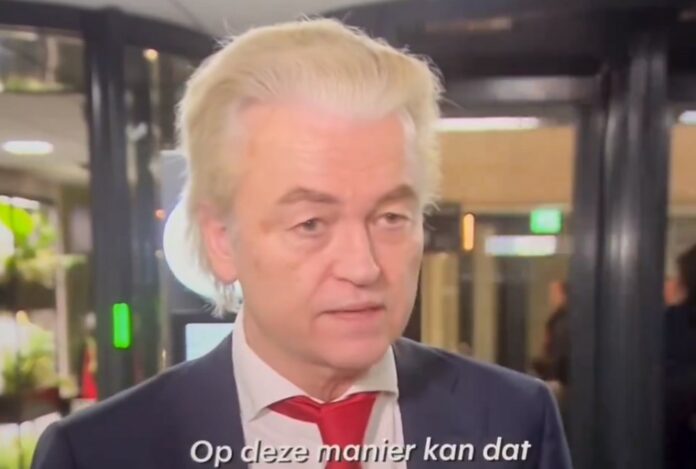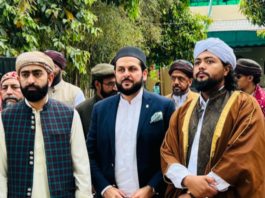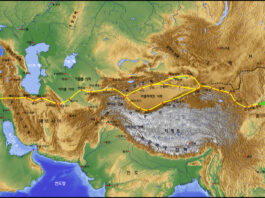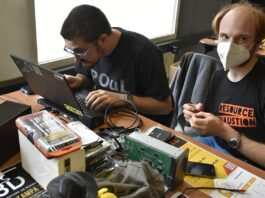As Geert Wilders celebrates the victory of his political party, the anti-migrant Freedom Party, known as the PVV, obtaining a majority win of 37 seats in the lower house of parliament, many questions arise about the popularity of his controversial political views.
“Wilders …toned down his anti-Islam rhetoric during the campaign, although his manifesto still contains proposals to ban Qurans, mosques and Muslim headscarves,” said Times of Israel on December 10.
His party’s success is being portrayed as a “shock win” or an unexpected success, yet Geert Wilders has been around for many years and his political views have never been hidden or secret. Given the climate of similar sentiment in other European governments, laws and bans against their Muslim and immigrant populations tie in with some of Wilders’ goals for the Netherlands.
The day after the election ended, the news outlet NL Times spoke on the PVV’s efforts to form a cabinet with other parties.
”As the leader of the largest party, Geert Wilders is a prominent candidate for Prime Minister. However, many parties are hesitant to work with his PVV, though much less hesitant than before. The [Dutch party] VVD is no longer an outright no, for example.” NL Times notes.
“While Pieter Omtzigt of the [Dutch party] NSC previously said that he wouldn’t work with the PVV as long as the party program states that Islam should be banned from the Netherlands, he refused to repeat that rejection after the polling stations closed,” the NL Times says.
Another article from the NL Times pinpoints the statistics of policies that PVV voters support.
“Many PVV voters don’t support the far-right party’s more radical views – ‘pushing back Islam’ and the Netherlands leaving the European Union. They expect their party will have to water down its standpoints in order to govern, and most are okay with that, according to a Hart van Nederland survey of 1,000 PVV voters in its opinion panel.”
Watering down the PVV stanpoints is not the same as getting rid of them. As the leader of the largest party, If Wilders becomes Prime Minister, his chances to see his political goals come to light aren’t beyond possibility if enough people are for them in the long run.
If he can change his stance and “water down” his extreme policies now, he will have the option of revamping his long held goals if he becomes prime minister in the future. Shifting gears is always a future possibility as well.
The NL Times report on the opinion panel continues, “There are some controversial standpoints that PVV voters still support… For example, 87 percent of PVV voters want to close the Dutch borders to asylum seekers, even though that is against international treaties.”
Any percent of this policy would be very uncomfortable for the people it would affect. The more controversial standpoints that a higher percentage of voters still support speaks volumes to the sentiment of, “We want less Islam in the Netherlands and we will achieve that through less non-Western immigration and the introduction of a general halt to asylum,” statements noted in an article by France24.com in late November explaining Wilders political stance against immigration.
Considering how Wilders has maintained his political career since 2006 without letting go of his “values,” most PVV voters know who they are backing and what his far reaching goals are.
The NL Times report on the survey results continues, “The survey results indicate that…70 percent have come to terms with the fact that the PVV will compromise on all of these points. 24 percent think that Wilders will hold firm on the more controversial positions. Only 6 percent believe the party won’t be part of the next government.”
With the current victory of the PVV holding the most seats in the lower house of parliament and the general consensus of the voters that catapulted the party to such success, it’s important not to forget what Geert Wilders stands for even if he, according to Dutchnews.com is prepared to put his controversial policies on “cold storage.”
The Times of Israel gave information on the subject from Lievnath Faber, the founder of Oy Vey, a Jewish group that hosts events and discussions in Amsterdam:
“Faber believes that Wilders’ victory has granted permission to a current of racism and xenophobia that abides in Dutch society — one that targets Muslims now, but might turn against Jews.”
“No matter what a politician might say,” Faber told the Times of Israel, “He might say he loves Jews and wants to protect Jews — we all know from our history, from our DNA that we are at risk when there is an extreme-right, anti-constitutional leader.”
“Commentators described Wilders as a milder, more responsible version of his old self. He told Nieuwsuur he was prepared to put the policies that have defined his party for 25 years into cold storage, such as a ban on the Qur’an and closing Islamic schools.” Duchnews.com reports.
The question is asked in this article by France24.com: ‘What Does Wilders and the PVV Stand For?’
“Wilders softened his anti-Islam rhetoric during the campaign, preferring to focus on issues such as cost-of-living, with some analysts describing him as ‘Geert Milders’…but what are his PVV’s policies?” France24.com asks.
France24.com gives a look into the PVV manifesto. Focusing on the more controversial policies could make many wonder about the sentiments of those they affect most:
“The PVV proposes a ‘freeze on asylum’ and ‘a generally more restrictive immigration policy,’ as well as an opt-out from EU asylum and migration rules.The party wants to restore Dutch border controls, turning away asylum-seekers attempting to enter the Netherlands,” the article states.
“Illegal immigrants will be detained and deported, Syrians with temporary asylum permits will have these withdrawn as ‘parts of Syria are now safe.’ Refugees with residence permits will lose them ‘if they go on holiday to their country of origin.’ EU nationals will require a work permit and the number of foreign students will be reduced,” the manifesto pledges, according to France24.com.
France24.com goes on to explain what Wilder hopes to achieve with his “restrictive immigration policy:”
“With a reduction in the asylum and immigration flood to the Netherlands, the Islamisation of our country will also be reduced… The Netherlands is not an Islamic country: no Islamic schools, Korans and mosques,” The NL Times report on the manifesto continues.
After expressing in the manifesto things and people they don’t want, the PVV makes clear who they see as allies. The France24.com article continues, the PVV is a “great friend of the only true democracy in the Middle East: Israel.”
“Wilders pledges to move the embassy of the Netherlands to Jerusalem and to close the Dutch representation in Ramallah, home to the ‘corrupt Palestinian Authority’,” according to France24.com
The manifesto states further, “Diplomatic relations will be broken off ‘immediately’ with countries with Sharia law,” according to France24.com.
None of these policies seem ”soft,” in fact all should make any Muslims/immigrants that already reside in the country fear for their rights.
According to an article by Dutchnews.nl Wilders showed confidence in his win and his PVV party policies:
“The general election results show that the voters of the Netherlands have had enough,” he said. “The Dutchman will be back in first place… The people of the Netherlands will get their country back and the tsunami of refugees and immigrants will be limited.”
According to another article by DutchNews.nl, not everyone is enthusiastic about the victory of thePVV. “Dutch News readers have been reacting with shock and disappointment at the election results and the huge rise in support for the far right PVV.”
Muslims and immigrants share their feelings about the subject with DutchNews.nl.
Angga Dwi from Indonesia, who has been in the Netherlands for almost a year said he is now having second thoughts about making the Netherlands his home. “I feel like the people of the Netherlands are going to be less open to other people and cultures. I am thinking about moving my career to more immigrant friendly countries such as Singapore, Dubai and Japan.” he tells DutchNews.nl.
“After seeing the exit polls last night, I couldn’t sleep,” a PHD student at Utrecht University, who requested anonymity, shares in an email with DutchNews.nl. He comes from a non-EU Muslim-majority country. “Like [a] lot of other migrants, we came to the Netherlands to flee from authoritarian regimes.”
The student continues, “But now we have a potential prime minister who wants to intervene in our lifestyle by the banning [of] clothes we are wearing and banning places we are going to worship. This level of authoritarianism proposed by Geert Wilders was not even the case in the country we left.” DutchNews.nl further reports.
He furthered his statement by pointing out the climate is not because of only the PVV. “I am… aware that Wilders is not the only one to blame for this situation. Other parties like the VVD and NSC also spent a lot of effort on blaming migrants for all problems in the country.” the student told DutchNews.nl.
IP Correspondent




